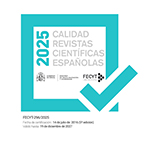Anonymous, oligarchs, poets and supplicants in Plato’s Republic
Abstract
The expulsion of the poets from the ideal city, a policy elaborated in Plato’s Republic, is one of the most commented episodes in the history of philosophy, so there seems to be little room for novelty on the subject. Yet, in this article I will highlight an issue unattended by the available scholarship: there is an intimate relationship between poetry and oligarchy, between imitators and the regime of government that occupies the center of the scale ranging from the best to the worst. Between the poets characterized by Plato and the oligarchs, I will propose that the difference is only a matter of degree, not of nature, in the same sense that the philosopher establishes the difference between a master and a king, both equally rulers. To this end, I will examine the treatment of the figures of the supplicant, the imitator, the oligarch, and Odysseus (as a character who synthesizes them), to address the common aspects that make their reunion possible. This will lead us to some conclusions about the conflict between Plato and anonymity.
Downloads
Article download
License
In order to support the global exchange of knowledge, the journal Revista de Filosofía is allowing unrestricted access to its content as from its publication in this electronic edition, and as such it is an open-access journal. The originals published in this journal are the property of the Complutense University of Madrid and any reproduction thereof in full or in part must cite the source. All content is distributed under a Creative Commons Attribution 4.0 use and distribution licence (CC BY 4.0). This circumstance must be expressly stated in these terms where necessary. You can view the summary and the complete legal text of the licence.












